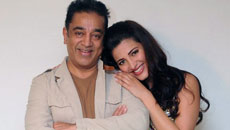Kader Khan rose from the depths of a Dickensian childhood in the Bombay of the 1940s, surrounded by drug peddlers, prostitutes, pimps and assorted thugs to eventually embody the essence of Hindi cinema.
Growing up in Kamathipura, Mumbai's notorious red light district that is at once cruelly heartless and touchingly heartfelt, Khan absorbed a vast range of human frailties and poured them in to 700 films that he acted in and wrote.
There is no comparable figure in cinema anywhere in the world where a master's in civil engineering juggled his writerly and actorly talents with such consummate ease in hundreds of movies for close to four decades.
By Khan's own reckoning, he acted in 450 movies and wrote dialogues and scripts for 250 films. That is an astonishing output even by the generally prolific standards of Hindi cinema.

Since Khan made writing and even a certain type of performance look so effortless, he often does not get his due for his remarkable contribution to Hindi cinema. Although born in Kabul, Khan went on to capture the quintessence of India's everyday pluralism in his writings. It was under the tutelage of director Manmohan Desai, who commissioned Khan to write for his movies starting in the early 1970s, that he went on to powerfully capture Bombay's street swag as reflected in its language.
Desai told this writer in 1986: "When I first met Kader Khan I told him, 'Tum miyabhai khali sher-o-shayri aur nawabi Urdu likhta hai. Hum ko kuchh gully ka chahiye. (You Muslim writers write only poetry and Urdu of the royal court. I need some street stuff.)' Khan also recalled Desai telling him that in his later interviews to others.
It was under those promptings that in movies such as "Roti" (1974) and "Amar Akbar Anthony" (1977) that Khan brought in the now famous Mumbai street patois into the Hindi cinema lexicon. Although his personal preference was high-minded and refined Indian and Russian literature, Khan perhaps subconsciously drew on his childhood memories to capture some of the street cool that audiences saw in movies such as "Muqqadar ka Sikander" (1978), "Laawaris" (1981), "Coolie" (1983) and somewhat later, "Agneepath" (1990).

Khan's lines for "Agneepath" have an ironic finality to them, and there could not be a more compelling actor than Amitabh Bachchan to do ironic finality in the kind of unpolished and fractured street lingo which Khan wrote with great effect.
"Agneepath" was full of crackling smart lines but two in particular encapsulate Khan's remarkable skills as a movie writer. In one scene, Bachchan, a gangster recuperating in a hospital, makes perhaps the most compelling case for pay rise for the police. When a police officer, played by Vikram Gokhale, insists that he could run his household on a salary of 1500 rupees with honesty, Bachchan replies: "Pagar badhao. Yeh policewale ka pagar badhao tum. Itna paisa mein ghar nahin chalta, sala imaan kaise chalega?" (Raise police salaries. If you can't run a household with such a small sum, how do you support your conscience?)
In another scene when several phones ring simultaneously in Bachchan's office, he says" "Ghalat cheeze banaya hai telephone. Udhar se aadmi sochta kuchh hai, bolta kuchh hai, karta kuchh hai. (The telephone is a flawed invention. The guy at the other end thinks something, says something else and does something entirely different.)"
At the time of the making of "Agneepath" Khan was at the peak of his craft and used to write and act so much that it was easy to discount his talent.

The movie's default temperament was the kind of sauciness that one routinely experiences in Mumbai's streets, especially among the young population that has no option but to live by its wits. Social resentments of the dispossessed and disenfranchised in Mumbai often result in very distilled bitterness which gets articulated in the kind of lines that Khan wrote for the film.
What made them particularly striking was that it was against his known literary tastes of someone who loved high-minded Urdu poetry of the caliber of Mirza Ghalib and others.
His passion for education, which he was to fondly recall as a gift of his mother Iqbal Begum's backbreaking struggles to educate him as a means to liberate him from his oppressive early life, stayed with him throughout his life. Khan loved mathematics, physics, engineering, machine drawing and well into his latter life, a serious study of Arabic. Those who knew him well said he was at heart always a teacher even on the movie set.
In a rather unusual acknowledgement of his formidable talents The Economist of London carried an obituary headlined, "All action man, Kader Khan, a hero of Indian cinema."

Soft-spoken, polite and unusually internally drawn, Khan had the gift of the gab and could converse across many subjects and themes. In his passing Indian cinema has lost someone who straddled the three distinct worlds of the written, spoken and performed with rare ease.

